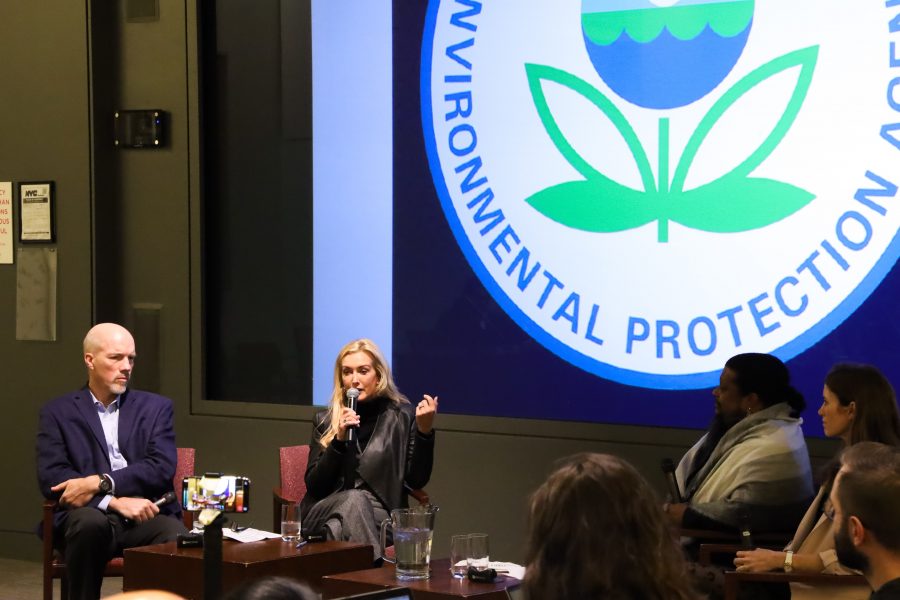As a child, Tyrone Hayes looked up to the Environmental Protection Agency as his hero for protecting him and the animals in his backyard. Now, as a Professor of Integrative Biology at the University of California, Berkeley, he believes the EPA and chemical manufacturers like the agriculture company Syngenta chip away at transparency and safety.
Hayes was a panelist at a Monday event titled “The Evening of Denial Event” co-sponsored by NYU’s Department of Environmental Studies and Center for the Humanities. The panel spoke about how science denial has affected the world and the panelists’ work, in the context of public health and environmental protection.
Hayes’ research focuses on atrazine, an herbicide used for agricultural weed control. While investigating the roles of atrazine on frogs, he found an enzyme introduced with atrazine in food and water has grave health effects.
“Atrazine is the number one contaminant found in drinking water in the U.S. and probably globally,” Hayes said at the event. “My findings brought me into conflict with the corporation, who targeted my family beyond the professional and led to personal persecution.”
Hayes’ research found that atrazine is linked with breast cancer in humans because of the increased estrogen production it causes. Atrazine has been banned by the European Union since the 1980s, though only a few restrictions have been placed on it in the U.S.
Another type of herbicide called Roundup — created by the Monsanto Company as a way to kill weeds — was branded as environmentally healthy by the corporation and became the largest herbicide in the world. Now, 42,700 plaintiffs are suing Monsanto, claiming Roundup causes cancer.
Investigative journalist and author Carey Gillam wrote about the topic in her award-winning book “Whitewash: The Story of a Weed Killer, Cancer and the Corruption of Science.”
“It’s pervasive in food systems, rainfall and urine samples,” Gillam said to a crowd of about 100 people. “Although scientists around the world found Roundup is a carcinogen, Monsanto successfully undermined the EPA to try to continue their notion that this is a safe product.”
Gilliam said her book and the information within it — which highlighted herbicide’s harmful effects — led to companies hiring public relations experts to discredit it, something that seemingly worked based on the EPA’s decision not to ban Roundup.
“The EPA decided to agree with [Monsanto] instead of their own scientists, saying these herbicides are not carcinogenic,” Gilliam said. “This outright government denial persists to this day.”
The notion of powerful businesses influencing public policy is nothing new. Kert Davies, Director of the Climate Investigations Center and former Greenpeace Research Director, helped expose oil giant ExxonMobil’s funding of organizations and individuals who worked to discredit climate science and delay climate policy.
“These organizations had full knowledge that burning fossil fuels continue to cause harm,” Davies told the audience. “It’s chilling. They knew better, they knew it would be over the cliff before we felt it: that’s pretty poisonous to know you are causing harm and come up with strategies to deny it. This is the core denial.”
Associate Professor of Environmental Studies Jennifer Jacquet said denial of science is a worrying and growing occurrence.
“The apparent types of knowledge are popular and scientific, yet ignored is the role of industry insistent in creating ignorance: the unmaking of knowledge,” Jacquet said. “No monarch, no church, no pastor and no pope has offered us these insights. Scientists are the most reliable deliverers.”
Hayes said his childhood adoration of the EPA conflicted with his real-life experience with it.
“Books on extinction made me cry as a little kid,” Hayes said. “I had a naive child dissolution about what the EPA actually was. I thought I would be my hero’s hero. When I actually encountered the EPA, I realized the monetary value is placed on shortened lives and weighed toward these chemical uses.”
Email Roshni Raj at [email protected].

























































































































































